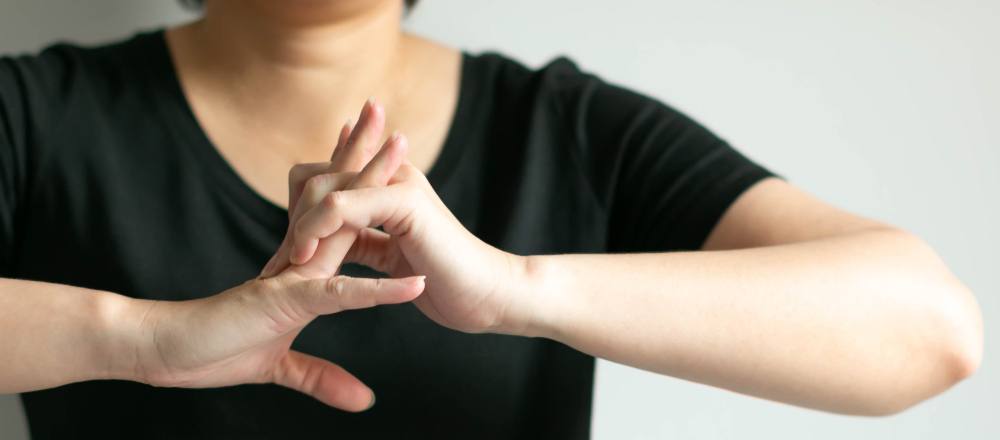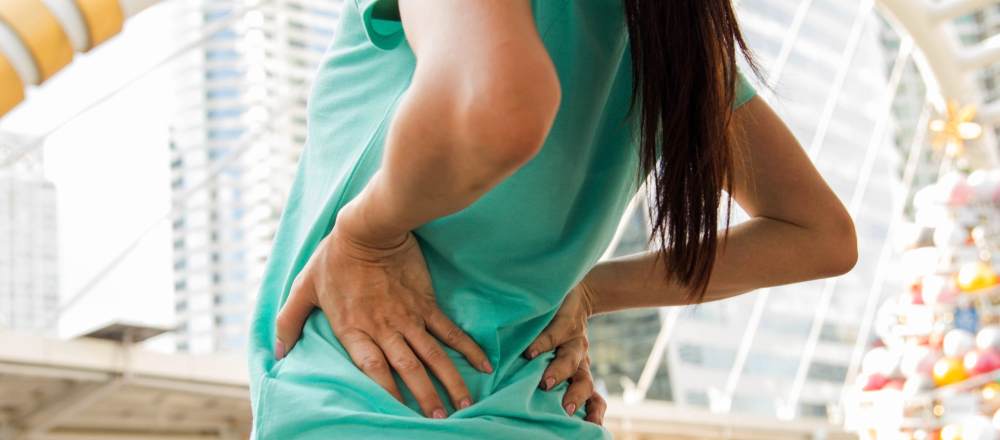 For some people, cracking your joints is part of daily life. You may frequently find yourself cracking your knuckles throughout the day. Or perhaps you notice pops and cracks when you get out of bed first thing in the morning. Sometimes a friend or coworker might even hear your popping or cracking sounds from across the room! Popping or cracking joints might sound scary, but that does not usually mean something bad is happening. As long as popping your joints doesn’t cause you any pain, you may be okay. It helps to understand what exactly goes on inside your joints, so you better understand what actually causes those interesting sounds. It is also important to understand what joints in the body you can pop or crack on your own and which ones might be better left to the professionals. If you are concerned about popping or cracking sounds in your joints, talk to your Jonesboro joint doctor to learn more about how this might impact you.
For some people, cracking your joints is part of daily life. You may frequently find yourself cracking your knuckles throughout the day. Or perhaps you notice pops and cracks when you get out of bed first thing in the morning. Sometimes a friend or coworker might even hear your popping or cracking sounds from across the room! Popping or cracking joints might sound scary, but that does not usually mean something bad is happening. As long as popping your joints doesn’t cause you any pain, you may be okay. It helps to understand what exactly goes on inside your joints, so you better understand what actually causes those interesting sounds. It is also important to understand what joints in the body you can pop or crack on your own and which ones might be better left to the professionals. If you are concerned about popping or cracking sounds in your joints, talk to your Jonesboro joint doctor to learn more about how this might impact you.
Why Joints Can Make a Popping Sound
The exact cause of the popping or cracking sound in the joints is unknown. However, several theories help make sense of what makes those sounds in your knuckles and other joints. Many doctors and scientists think popping your joints causes a sound because of gases that build up in and around the joints. As air bubbles build up in the joint, certain pressure or movements can cause a sudden release of those bubbles and make a sound. You may also hear a cracking or popping sound as the structures in and around the joints move around one another. For example, when you pop your knuckles, you put slight pressure on the joint that causes minor adjustments to the structure of the joint. The sound could result from tissues like tendons gliding against one another as they shift into place.
In the medical field, popping and cracking sounds in the joints are known as crepitus. Crepitus sounds without any pain or other symptoms are usually harmless and commonly occur in the knuckles, knees, shoulders, and neck. Popping and cracking joints can occur at any age, though it is common for those sounds to increase with aging. Most people’s joints will pop or crack on occasion, and this is typically not a cause for concern unless accompanied by pain and other symptoms. When you notice crepitus along with pain and discomfort, you might be dealing with an underlying medical condition. In these cases, the popping or cracking sound might be caused by a loss of cartilage and bones rubbing together. Crepitus can be harmful but can also occur with conditions like osteoarthritis, tendonitis, and even certain knee injuries like a meniscal tear.
Benefits & Drawbacks to Popping Your Joints
The jury is out on whether or not popping your joints offers any true health benefits, though many people say it offers relief. People who frequently crack their knuckles report feeling like they feel like pressure around the knuckles has been released. This sense of satisfaction may occur immediately after popping your knuckles when gas bubbles are released. However, those gas bubbles will start to re-form inside the joint, and you may feel the need to crack your knuckles again. When you pull or put gentle pressure on your knuckles or other joints with the goal of hearing that popping sound, pressure around the joint temporarily decreases. As you go about your day and those gasses start to build up again, you might notice a creeping sense of tension in your fingers and other muscles in the body. Popping your joints can be a way to relieve tension in a place where you have more control over your sensations.
Contrary to what your parents and grandparents might have told you, popping your knuckles will not actually lead to arthritis. While people with arthritis can experience crepitus, the sounds are generally accompanied by pain and other symptoms of the inflammatory disease. However, feeling the desire to frequently pop your joints might signify that you have an underlying abnormality in the structures of your joint that may benefit from medical attention. If cracking your knuckles or other joints never used to hurt, but now you notice some slight discomfort or a tingling sensation afterward, then talk to your doctor. Any changes that include pain and discomfort could be a sign of something more serious going on.
What to Do When Popping Your Joints Hurts
 Talk to your Jonesboro doctor if you notice popping your joints starts to hurt. Even slight pain and discomfort while popping your joints could be a sign of a developing health condition like arthritis or an injury to tissues in the joint. If you notice swelling or changes in the shape of your joints, then visit your doctor as soon as possible. Your doctor will likely perform a physical examination and want to know when you first noticed these signs. Remember, it’s okay if you occasionally pop your knuckles or hear cracking sounds when you stretch. It’s important to let your doctor know these things so they can get a good grasp of your medical history and determine the reason for your pain. Crepitus along with pain are typically two of many symptoms of a health condition or injury.
Talk to your Jonesboro doctor if you notice popping your joints starts to hurt. Even slight pain and discomfort while popping your joints could be a sign of a developing health condition like arthritis or an injury to tissues in the joint. If you notice swelling or changes in the shape of your joints, then visit your doctor as soon as possible. Your doctor will likely perform a physical examination and want to know when you first noticed these signs. Remember, it’s okay if you occasionally pop your knuckles or hear cracking sounds when you stretch. It’s important to let your doctor know these things so they can get a good grasp of your medical history and determine the reason for your pain. Crepitus along with pain are typically two of many symptoms of a health condition or injury.
When to See a Chiropractor for Popping Joints
Some people associate chiropractors with cracking your back, but chiropractors actually do a lot more than that. Chiropractic care incorporates a range of non-invasive and all-natural treatment techniques to address posture, injuries, health conditions, and wellness goals. The technique commonly associated with chiropractors is known as a chiropractic adjustment. Chiropractors use targeted pressure on joints to resolve misalignments and restore healthy functioning to the body. Chiropractic adjustments involve manipulating the joints, which can result in cracking or popping sounds. However, not every chiropractic adjustment will make that sound. If you don’t hear a cracking or popping sound when you see a chiropractor, it doesn’t mean the treatment isn’t working. Cracking your back versus going to see a chiropractor actually involves two different experiences, though both might lead to popping or cracking sounds in your joints.
What to Know About Popping Your Neck and Back
Unlike popping your knuckles, fingers, and toes, which is typically harmless, you might want to skip cracking your neck or back on your own and trust that to the professionals. Anything that affects your spine should be taken seriously to avoid accidentally causing any damage or injury to the area. If a twist or turn naturally results in a popping sound in your neck or back, it may not cause you much harm. But forcefully cracking your own neck and back can lead to problems when done incorrectly or with too much force. While popping your neck or back might seem like your best option for relieving pressure on the area, you may want to talk to your doctor first. Popping your joints will only provide you with temporary relief and may even be a placebo effect. Instead, visit your Jonesboro chiropractor or physical therapist to get quality, professional treatment to help reduce a buildup of pressure on your neck and spine. Chiropractors and physical therapists offer neck and back pain treatment options to provide you with long-lasting relief and help you avoid damaging your spine.
Cracking your neck and back can cause a temporary rush of chemicals in the body called endorphins. These endorphins may create a positive mental effect like a sudden feeling of happiness or relief. But you want to avoid putting too much pressure on your spine or trying to pop your neck and back on your own. If you crack your back incorrectly, it can lead to even greater misalignments in your spine that may just make your pain and other symptoms worse. Popping your neck and back can also lead to hypermobility by overstretching the muscles and tendons that support your spine. The best way to experience relief from popping joints in your neck and back is to visit your Jonesboro chiropractor. Chiropractors utilize chiropractic adjustments and other treatment options in a safe and controlled environment.
How to Reduce Popping Sounds in Your Joints
You can also talk to your chiropractor or physical therapist about how to reduce popping sounds in your joints. Sometimes your joints might make more cracking or popping sounds when you engage in certain movements or activities. If you have a lot of built-up pressure and friction in your joints, then your doctor can talk to you about ways to effectively relieve it. Engaging in regular activities and exercises can help keep your joints lubricated and moving more smoothly. Sometimes popping sounds might be a sign that you are not getting enough exercise. Learning how to move your body more safely and effectively can help reduce these sounds, resolve any associated pain, and help improve your overall strength and mobility.
Visit AICA Orthopedics in Jonesboro to learn more about how our team of doctors can help you. We have orthopedic surgeons, chiropractors, physical therapists, and neurologists who work together to provide you with quality, comprehensive treatment and care.
